Goaltide Daily Current Affairs 2020
Current Affair 1:
Transgender Persons (Protection of Rights) Act, 2019.
News:
In a major push for gender reform, the Union home ministry is set to allow transgender persons to join paramilitary forces like the CRPF, the BSF, the CISF and the ITBP. We have already received approvals from the BSF, the CISF and the ITBP. The decision is in line with the Transgender Persons (Protection of Rights) Act, notified by the Central government in December 2019, under which no establishment can discriminate against transgender persons in matters relating to employment, recruitment and promotion.
Ok, we will go through Act in detail.
We should always take care of these Acts. The Acts based o gender equality, social issues, gender empowerment are very important. Any statement they can pick from Act and can ask you in Prelims. For example:
- Does Certification of identity of Transgender can be provided only by competent court?
- Does National Council of Transgender Person set up under this Act chaired by Secretary or Union Minister?
- Does Act define Gender Identity, Transgender Persons, inter sex variations?
After reading this document everything can be answered.
- Section 2(k) defines a transgender person to include both individual identities & socio-cultural identities.

- The Act also defines intersex variations.

Criticism: Does this give any substantial rights to intersex persons, apart from whatever is part of being recognized as transgender persons? This Act does not even ban the forced and unnecessary sex reassignment surgeries performed on intersex infants. The Parliament failed to discuss or ban the surgery, something which a Single-Judge Bench of the Madras High Court did when an intersex person approached the Court. Why do you call this Act 'Protection of Rights'? Whose rights and interests are it actually protecting? Debatable.
- The Act has nowhere defined Gender Identity. This makes me wonder, what is the objective of this? Why has the Parliament not discussed gender identity, gender non-conforming persons, expression or even sexual orientation? Debatable.
- The Bill prohibits the discrimination against a transgender person, including denial of service or unfair treatment in relation to: (i) education; (ii) employment; (iii) healthcare; (iv) access to, or enjoyment of goods, facilities, opportunities available to the public; (v) right to movement; (vi) right to reside, rent, or otherwise occupy property; (vii) opportunity to hold public or private office; and (viii) access to a government or private establishment in whose care or custody a transgender person is
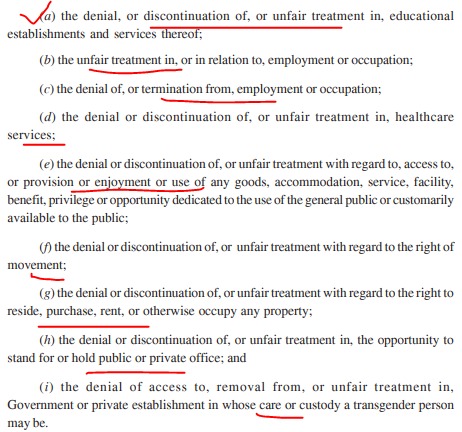
- Every transgender person shall have a right to reside and be included in his household. If the immediate family is unable to care for the transgender person, the person may be placed in a rehabilitation centre, on the orders of a competent court.

- No government or private entity can discriminate against a transgender person in employment matters, including recruitment, and promotion. Every establishment is required to designate a person to be a complaint officer to deal with complaints in relation to the Act.

- Educational institutions funded or recognised by the relevant government shall provide inclusive education, sports and recreational facilities for transgender persons, without discrimination.

- The government must take steps to provide health facilities to transgender persons including separate HIV surveillance centres, and sex reassignment surgeries. The government shall review medical curriculum to address health issues of transgender persons and provide comprehensive medical insurance schemes for them.
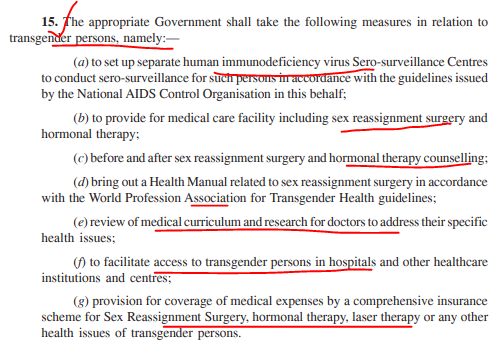
- A transgender person may make an application to the District Magistrate for a certificate of identity, indicating the gender as ‘transgender’. A revised certificate may be obtained only if the individual undergoes surgery to change their gender either as a male or a female.

- National Council for Transgender persons (NCT):

Other members include representatives of the NITI Aayog, and the National Human Rights Commission. State governments will also be represented. The Council will also consist of five members from the transgender community and five experts from non-governmental organizations.
- The Council will advise the central government as well as monitor the impact of policies, legislation and projects with respect to transgender persons. It will also redress the grievances of transgender persons.

- The Bill recognizes the following offences against transgender persons: (i) forced or bonded labour (excluding compulsory government service for public purposes), (ii) denial of use of public places, (iii) removal from household, and village, (iv) physical, sexual, verbal, emotional or economic abuse. Penalties for these offences vary between six months and two years, and a fine.
Current Affair 2:
Active Pharmaceutical Ingredients
The report titled ‘Active Pharmaceutical Ingredients- Status, Issues, Technology Readiness, and Challenges’ was brought out recently by Technology Information Forecasting and Assessment Council (TIFAC), an autonomous organization under the Department of Science & Technology.
API is very important for your exam now. So, we covered this topic in bit detail. Read every paragraph.
Introduction is very important for any topic: It helps you to understand the basic and then you can proceed easily. Moreover, it also provides introduction part for Mains answer. So, read below introduction first.
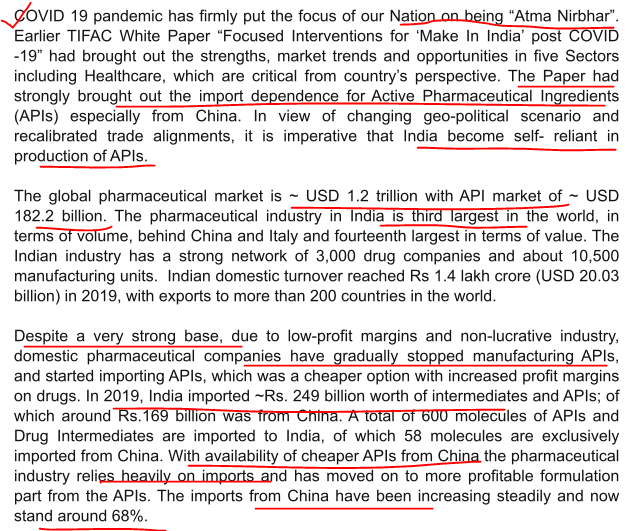
What is API?
Every medicine is made up of two main ingredients — the chemically active APIs and chemically inactive, excipients, which is a substance that delivers the effect of APIs to one’s system. API is a chemical compound that is the most important raw material to produce a finished medicine.
API status of India:
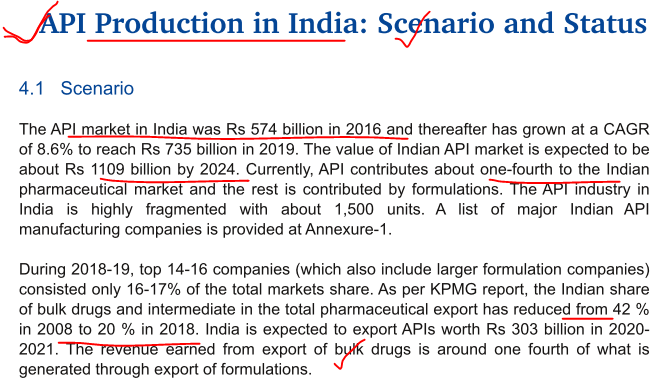
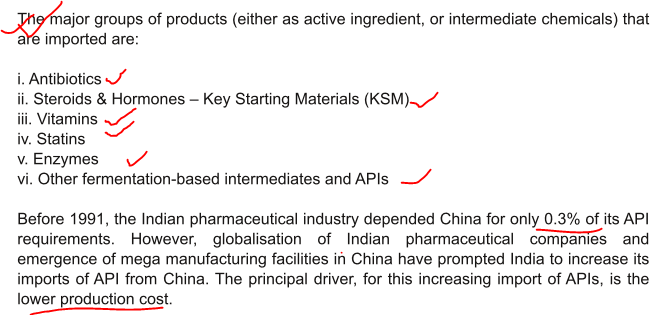
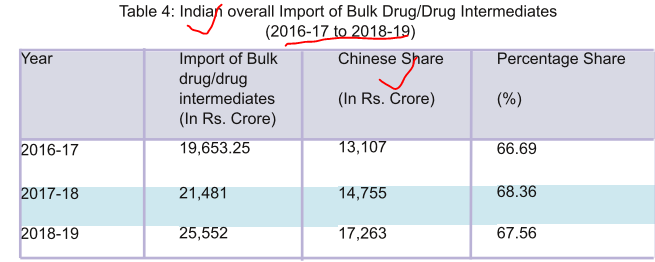
Major Impediments and Concerns:

Initiatives of Government of India:


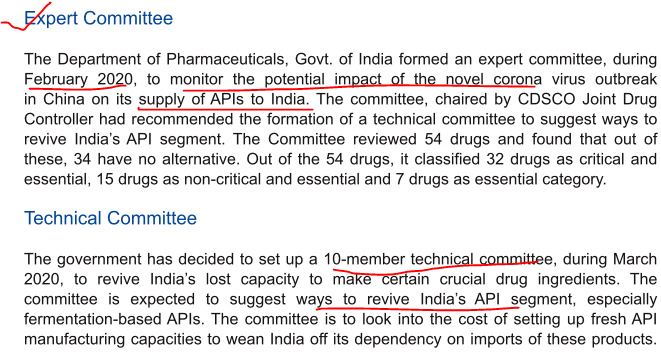



Major recommendations given in the report:
- Focus on engineering and scale aspect of technology development.
- Need for Mission mode Chemical Engineering with defined targets for uninterrupted synthesis of molecules.
- Create mega drug manufacturing clusters with common infrastructure in India.
- Technology platform to be developed for biocatalysis towards reducing process steps for cost optimization.
- Scale supporting techno-economic feasibility.
- Attention to technologies like hazardous reactions, flow chemistry, cryogenic reactions, and membrane technology.
Also see TIFAC:

Current Affair 3:
India Energy Modeling Forum
In the recent joint working group meeting of the Sustainable Growth Pillar, an India Energy Modeling Forum was launched. NITI Aayog will initially coordinate the activities of the forum and finalizing its governing structure.
What is Energy Modelling?
Energy modeling or energy system modeling is the process of building computer models of energy systems in order to analyze them. Such models often employ scenario analysis to investigate different assumptions about the technical and economic conditions at play.
The India Energy Modelling Forum will accelerate this effort and aim to:
- Provide a platform to examine important energy and environmental related issues;
- Inform decision-making process to the Indian government;
- Improve cooperation between modelling teams, government, and knowledge partners, funders;
- Facilitate exchange of ideas, ensure production of high-quality studies;
- Identify knowledge gaps at different levels and across different areas;
- Build capacity of Indian institutions.
Do we have Energy Modelling Forum elsewhere in world?
There exist energy modelling forums in different parts of the World. The Energy Modelling Forum (EMF) in USA was established in 1976 at Stanford University to connect leading modelling experts and decision makers from government, industry, universities, and other research organizations. The forum provides an unbiased platform to discuss the contemporary issues revolving around energy and environment.
Current Affair 4:
Vallarpadam Terminal
Recently, the Ministry of Shipping reviewed the development of the country's first trans-shipment hub - Kochi International Container Trans-shipment Terminal (ICTT). ICTT is locally known as the Vallarpadam Terminal.
It is a part of the Cochin Port in Kochi, Kerala. It is located on Vallarpadam Island.
Expected Benefits:
- It will cut India’s dependence on neighboring hub ports such as Colombo in Sri Lanka, Jebel Ali in Dubai and Port Klang in Malaysia to send and receive container cargo, thus saving time and cost for exporters and importers.
- It is in line with the Prime Minister’s vision of Atmanirbhar Bharat. It will ensure that Indian cargo trans-ship through an Indian Port.
- Further, the Indian ocean is one of the most critical maritime transportation links in the world.
- It will facilitate the setting up of port-based industries and their allied facilities such as Container Freight Station, Island Container Depots, etc. in Kerala which will generate additional employment opportunities.
Current Affair 5:
Woolly-Necked Storks Are Bouncing Back
A multi-year programme for monitoring large water birds in the farmlands of Gujarat, Haryana, Rajasthan and Uttar Pradesh is throwing up pleasant surprises. These landscapes have been found to support previously unknown populations of one of the least studied stork species in the world: the woolly-necked storks (Ciconia episcopus).
Older population estimates had suggested that fewer than 35,000 of these birds exist in South and Southeast Asia. But new data suggests their number could be 120,000-310,00 birds in South Asia alone.



<< Previous Next >>



